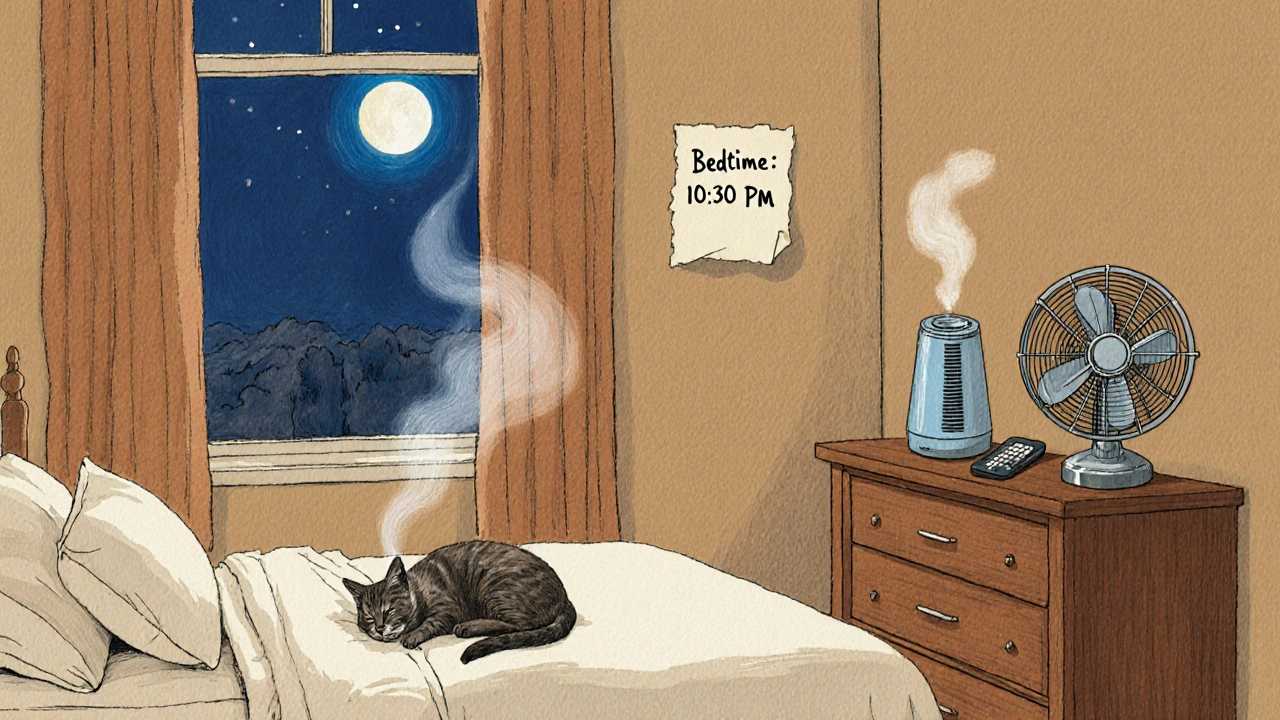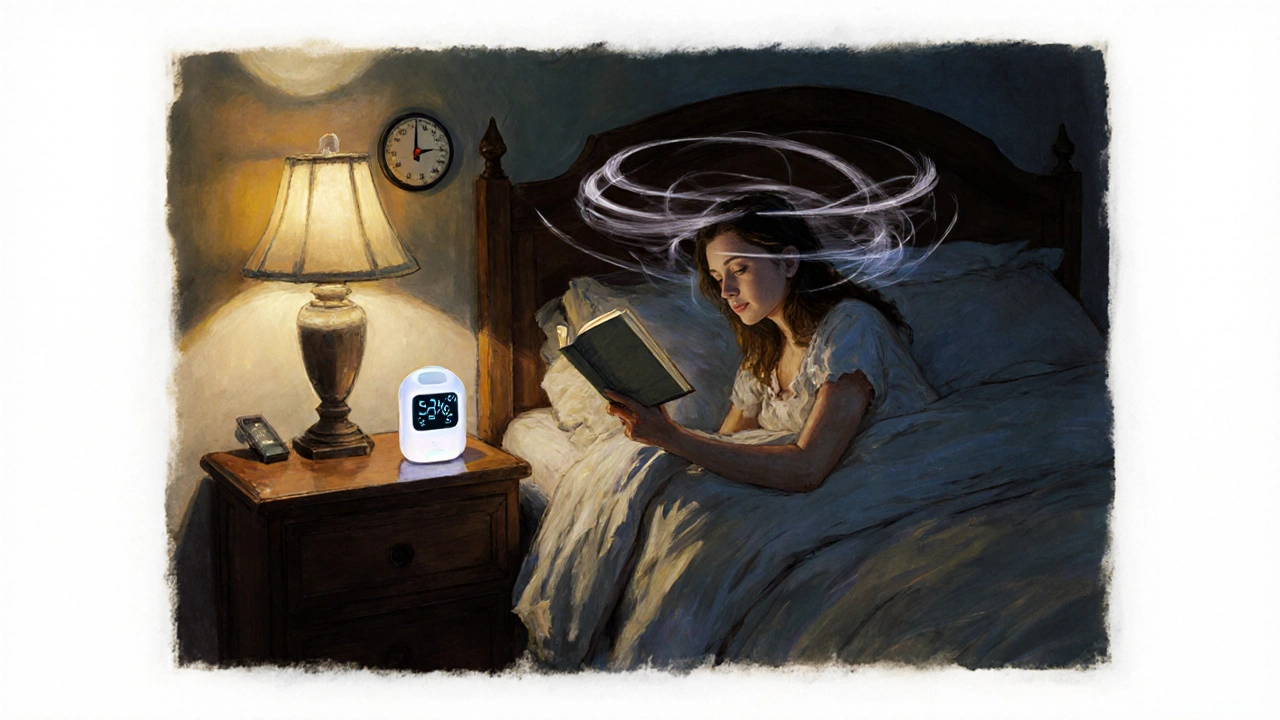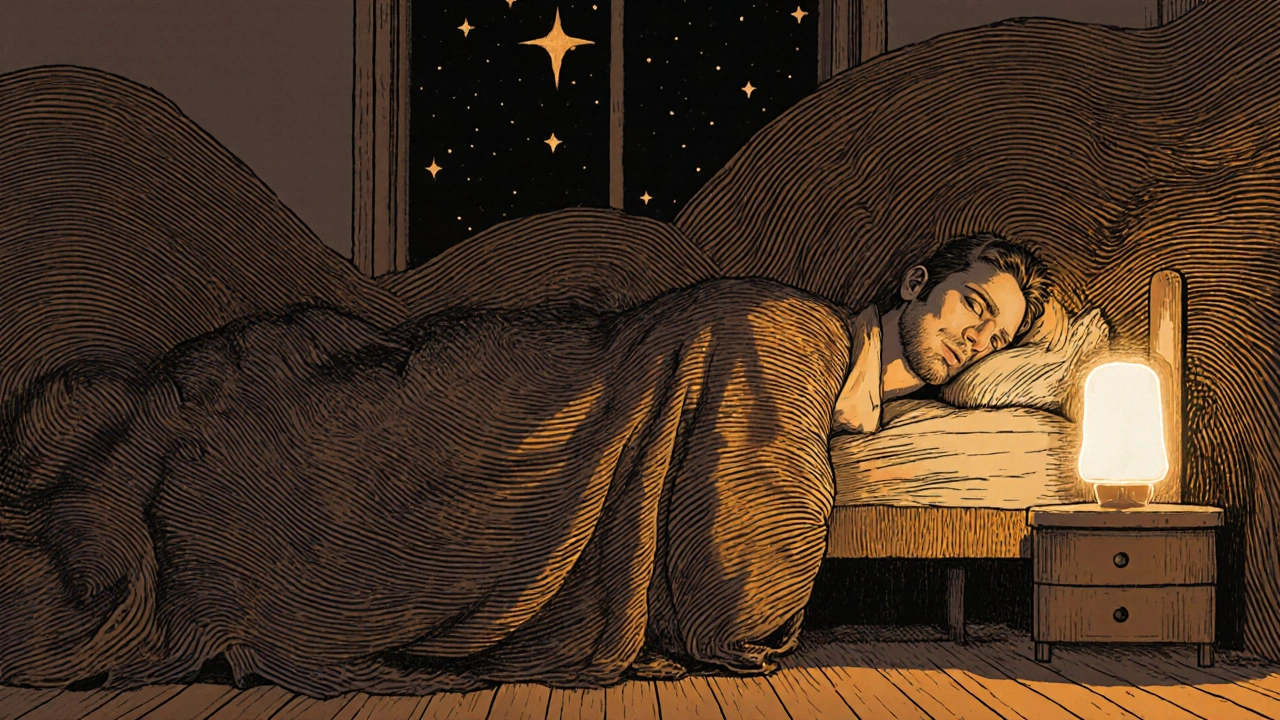Why tinnitus gets worse at night
When the house goes quiet, your ears don’t. That’s the cruel trick of tinnitus after dark. The ringing, buzzing, or hissing you barely notice during the day suddenly feels deafening once you lie down. It’s not just in your head-it’s how your brain works. Without background noise to distract it, your auditory system starts hunting for sounds. And since there’s nothing real out there, it amplifies the internal noise you’ve been ignoring. Studies show this spike in perception can be as high as 40% in complete silence.
That’s why falling asleep becomes a battle. You’re tired, but your brain won’t shut off. The more you fight it, the more anxious you get. And anxiety? It spikes cortisol, which makes the tinnitus louder. It’s a loop: tinnitus keeps you awake, and being awake makes the tinnitus worse.
Sound masking: The most proven fix
The goal isn’t to drown out the ringing. It’s to soften its edges. That’s where sound masking comes in-and it’s backed by decades of clinical research. The key is volume: set your sound therapy just under the level of your tinnitus. Too loud? It stresses your ears. Too quiet? It does nothing.
Not all noise is the same. White noise (equal energy across frequencies) is common, but many people find it harsh. Pink noise, with more low-end, feels smoother. Brown noise, even deeper and rumbling, is the top pick for 68% of users in Widex’s 2023 survey. Green noise, centered around mid-frequencies, works well for those with high-pitched ringing.
Devices matter. A basic $30 fan can produce 45-55 decibels of steady noise-enough to mask tinnitus without being intrusive. But dedicated sound machines like the LectroFan Classic ($99.99) offer 20 customizable sounds and precise volume control. Smartphone apps? They’re convenient but unreliable. Battery drain, interruptions, and inconsistent output make them a poor long-term choice.
Temperature, humidity, and your bedroom environment
Your bedroom isn’t just a place to sleep-it’s a healing space. Tinnitus sensitivity increases when your body is stressed by environmental extremes. The ideal temperature? Between 60-67°F (15.6-19.4°C). Too warm? Your body struggles to drop into deep sleep. Too cold? Muscles tense, and that tension can make tinnitus feel sharper.
Humidity is just as important. Dry air, especially from heaters in winter, can irritate the auditory nerve. Aim for 40-60% humidity. A simple humidifier next to your bed helps. If you live in a dry climate like Sydney’s winter months, this one change alone can reduce nighttime tinnitus spikes by up to 20%.
Sleep schedule: The quiet hero
There’s no magic pill. But there is a magic routine. Going to bed and waking up at the same time every day-even on weekends-cuts tinnitus-related sleep disruption by 33%, according to Healthy Hearing’s 2023 data. Why? Your brain thrives on rhythm. Irregular sleep confuses your nervous system, making it hypersensitive to internal noise.
It takes time. Don’t expect results after two nights. Stick to your schedule for at least 14 days. Set a phone reminder. Use a sleep tracker like Oura Ring or Fitbit to monitor progress. One Reddit user, u/SilentNights87, went from 90-minute sleep onset to under 30 minutes after 18 days of strict timing, verified by his sleep data.

CBT for tinnitus: When sound isn’t enough
If sound therapy helps a little but you’re still lying awake, stressed and frustrated, it’s time to look at your brain’s response-not just the sound. Cognitive Behavioral Therapy (CBT) for tinnitus isn’t about changing the noise. It’s about changing how you react to it.
Studies show CBT reduces nighttime distress by 72% after eight weeks. That’s far better than sound therapy alone (45%). But here’s the catch: only 38% of people finish the full program. It’s hard. You need a trained therapist. Sessions usually run 6-12 weeks, and insurance rarely covers it. In the U.S., only 37% of health plans pay for tinnitus-specific CBT.
If you can access it, it’s worth it. The goal is to rewire your brain’s alarm system. Instead of thinking, “This sound means I’ll never sleep,” you learn to think, “This is just noise. It’s not dangerous.” Over time, your brain stops treating it like a threat.
What doesn’t work-and why
Not every tip you find online is backed by science. Avoid these common traps:
- Complete silence: Turning off all sound makes tinnitus louder. Your brain fills the void.
- Earplugs at night: Unless you have hyperacusis (extreme sound sensitivity), earplugs can make tinnitus worse by creating even more silence.
- Alcohol to fall asleep: It may help you nod off, but it fragments your sleep cycle and increases tinnitus the next day.
- Screen time before bed: Blue light suppresses melatonin. Less melatonin means less deep sleep-and more tinnitus awareness. Cut screens 90 minutes before bed.
Real user stories: What actually helped
People with tinnitus aren’t just statistics. They’re real people finding real relief.
One user on Trustpilot, after trying 12 apps, settled on White Noise Lite. “It’s the only one that doesn’t glitch,” they wrote. “I play brown noise at 48dB. I sleep 6.5 hours now. Used to be 3.”
Another, with hyperacusis, couldn’t tolerate any sound. Their solution? Custom-molded earplugs with 15dB attenuation, paired with daily CBT. “I still hear the ringing,” they said. “But I don’t panic anymore.”
The most successful users combine three things: sound therapy, consistent sleep timing, and no screens before bed. Research shows this trio improves outcomes by 47% compared to using just one method.

What’s new in 2025
The field is moving fast. In May 2023, the FDA cleared the Lenire device-the first prescription neuromodulation system that combines sound with gentle tongue stimulation. In trials, 65% of users saw reduced tinnitus severity.
Widex’s Moment 4.0 hearing aids now include real-time notch therapy, which targets your exact tinnitus frequency and cancels it out. But it only works if you have hearing loss.
And then there’s AI. Apps like Tinnitus Talk (version 2.3.1, updated October 2023) now use your phone’s mic to analyze your tinnitus tone and match it with the perfect sound. Accuracy? 89%.
Future tech? Researchers at McMaster University are testing EEG-guided systems that adjust sound therapy in real time based on your brainwaves. Early results show 78% improvement in sleep efficiency. It’s not on the market yet-but it’s coming.
How to start tonight
You don’t need to overhaul your life. Start small.
- Turn on a fan or buy a basic sound machine. Set it to brown noise at 50dB.
- Set a bedtime and wake-up time. Write it on your mirror.
- Put your phone in another room 90 minutes before bed.
- Keep your room between 62-65°F. Add a humidifier if the air feels dry.
- Give it 7 nights. Your brain needs time to adapt.
If you’re still struggling after two weeks, look into CBT. Search for a certified tinnitus therapist through the American Tinnitus Association’s free helpline. They’ve been helping people since 1971.
When to see a doctor
Not all tinnitus is the same. See a specialist if:
- The ringing is only in one ear
- It’s pulsing like a heartbeat
- You have sudden hearing loss
- It’s accompanied by dizziness or balance issues
These could signal an underlying medical issue-like an acoustic neuroma or vascular problem-that needs imaging or treatment.
Can tinnitus go away on its own at night?
Tinnitus rarely disappears completely without intervention. But its impact on sleep can be drastically reduced. With consistent sound therapy and sleep hygiene, many people stop noticing it at night within a few weeks. The brain learns to filter it out, like background traffic during the day.
Is white noise better than pink or brown noise for tinnitus?
There’s no universal answer. White noise is the most common, but many find it too sharp. Pink noise is smoother and better for high-pitched ringing. Brown noise, with its deep rumble, is preferred by 68% of users in clinical surveys. Try each for 3-5 nights. Your brain will tell you which one feels most calming.
Should I use earplugs to block out tinnitus at night?
No-not unless you have hyperacusis (extreme sensitivity to sound). Earplugs create silence, and silence makes tinnitus louder. Instead, use sound masking to gently cover the noise. If you must use earplugs, choose ones with low attenuation (10-15dB) and combine them with a sound machine.
Can stress make tinnitus worse at night?
Yes. Stress raises cortisol, which directly increases tinnitus perception. That’s why people often notice it most when they’re tired or anxious. Managing stress with meditation, breathing exercises, or CBT is just as important as sound therapy. One study showed cortisol levels rise 25-30% during tinnitus flare-ups.
Do tinnitus apps really work?
Some do, some don’t. Apps like White Noise Lite have a 4.7/5 rating because they’re reliable and offer high-quality, uninterrupted sounds. But many apps crash, drain battery, or have poor audio quality. For nighttime use, dedicated hardware devices are more consistent. Use apps only as a temporary solution while you find what works long-term.
Is there a cure for tinnitus?
There’s no cure yet. But there are highly effective ways to manage it-especially for sleep. Sound therapy, CBT, and sleep hygiene can reduce nighttime distress by up to 72%. The goal isn’t to eliminate the sound. It’s to make it irrelevant so you can sleep peacefully.
How long does it take for sound therapy to work?
Most people notice improvement within 7-10 nights. But full adaptation takes 2-4 weeks. Your brain needs time to relearn that the sound isn’t a threat. Don’t give up after a few bad nights. Consistency is the key. Track your sleep with a simple journal: note your bedtime, sound used, and how rested you felt.


satya pradeep
November 17, 2025 AT 22:41Kathryn Ware
November 19, 2025 AT 09:43kora ortiz
November 20, 2025 AT 21:51Prem Hungry
November 21, 2025 AT 03:04Jeremy Hernandez
November 22, 2025 AT 14:34Leslie Douglas-Churchwell
November 23, 2025 AT 08:35Tarryne Rolle
November 24, 2025 AT 09:54Elia DOnald Maluleke
November 25, 2025 AT 08:33shubham seth
November 26, 2025 AT 08:57Deb McLachlin
November 26, 2025 AT 17:28